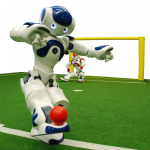Crazy Robots2014 - 2015
Crazy Robots is a science communication project of the Vision for Robotics Group, funded by FWF Wissenschaftsfonds. The project aims to teach school students robotics from the product development perspective and addresses all students (not only the ones interested in Science, Technology Engineering, and Mathematics – STEM). Read more →
SQUIRREL2014 - 2018
Clutter in an open world is a challenge for many aspects of robotic systems, especially for autonomous robots deployed in unstructured domestic settings, affecting navigation, manipulation, vision, human robot interaction and planning. Squirrel addresses these issues by actively controlling clutter and incrementally learning to extend the robot’s capabilities while doing so. Read more →
Argonauts2014 - 2016
Total has launched in December 2013, the ARGOS Challenge (Autonomous Robot for Gas and Oil Sites), an international robotics competition designed to foster the development of a new generation of autonomous robots adapted to the oil and gas sites. These robots will be capable of performing inspection tasks, detecting anomalies and intervening in emergency situations. Read more →
FRANC2013 - 2015
While in modern agriculture increasingly powerful complex machines with advanced technology are used organic farming is characterized by multiple manual tasks. The project FRANC develops and builds an autonomous vehicle which can be used especially in organic farming. Read more →

STRANDS2013 - 2017
STRANDS aims to enable a robot to achieve robust and intelligent behaviour in human environments through adaptation to, and the exploitation of, long-term experience. Our approach is based on understanding 3D space and how it changes over time, from milliseconds to months. Read more →
V4HRC2013 - 2016
The aim is to explore how human dyads cooperate in vision-based tasks and how they achieve grounding. The findings from human dyad will then be transferred in an adapted manner to human-robot interaction in order to inform the behavior implementation of the robot. Read more →
HOBBIT2011 - 2015
While world players in home care robotics tend to follow a pragmatic approach such as single function systems (USA) or humanoid robots (Japan, Korea), we introduce a new, more user-centred concept called “Mutual Care”: By providing a possibility for the Human to “take care” of the robot like a partner, real feelings and affections toward it will be created. Read more →
Meta Mechanics2008 - 2009
The metamechanics RoboCup@Home team was established in late 2008 at the Vienna University of Technology. It is a mixed team of the Faculty of Electrical Engineering and Information Technology and the Department of Computer Science. Read more →

GRASP2008 - 2010
The aim of GRASP is the design of a cognitive system capable of performing tasks in open-ended environments, dealing with uncertainty and novel situations. The design of such a system must take into account three important facts: i) it has to be based on solid theoretical basis, and ii) it has to be extensively evaluated on suitable and measurable basis, thus iii) allowing for self-understanding and self-extension. Read more →

Austrian Kangaroos2008 - 2009
Soccer among robots is entertaining, but it is a valuable testing field for research and development in all sorts of areas. The humanoid robots are an ideal platform for development and are being used by many international universities. Research comprises novel walking algorithms, artificial intelligence, image processing and software architecture for embedded systems in real time. Read more →